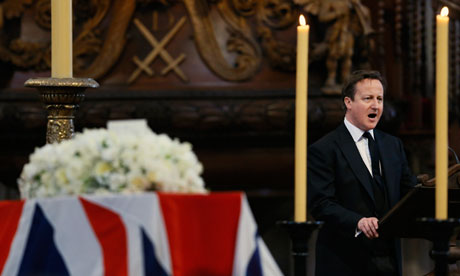
David Cameron delivers a reading during the ceremonial funeral of Margaret Thatcher. Photograph: AFP/Getty Images
About the author:
Giles Anthony Fraser (born 27 November 1964) is a priest of the Church of England. He is currently the parish priest at St Mary’s, Newington, in the Elephant and Castle, London. He was previously Canon Chancellor of St Paul’s Cathedral from 2009 until his resignation in October 2011. As Canon Chancellor, Fraser fulfilled the role of a canon residentiary with special responsibility for contemporary ethics and engagement with the City of London as a financial centre. He was also the director of St Paul’s Institute(Wiki).
Rev Giles Fraser resigned in protest over Occupy London’s forced removal
[youtube http://www.youtube.com/watch?v=LX8qycf0l6U]But the church ought to make an uncomfortable partner in all of this, and not allow itself to be conscripted into the spiritual arm of the Tory party. Especially as the church was one of the most vocal sources of opposition to Thatcherism during the 1980s. Indeed, it was in St Paul’s that Thatcher fell out with Robert Runcie because he prayed for the Argentinians. Singing I Vow to Thee my Country – despite the second verse’s qualification that nationalism is subject to a higher authority – is a poor guide to Christian reflection on her flag-waving patriotism. And He who Would Valiant Be can too easily be read as a theological defence of her stubborn “not for turning” defiance of dissent. All this jarred – and not least because the hymn choices were just a little too Magic FM.
The bishop of London did his bit in the name of balance to slip in a reference to the Tolpuddle Martyrs – they were Methodists not proto-Marxists, he said. But it was no more than a gesture. His jest about discussing Hayek over the duck pâté was the real giveaway. It is at such dinners that the establishment recognises each other as “one of us”. Moreover, it felt strange to hear of that the great champion of the individual was apparently in favour of interdependence. This from the woman who actively disliked the whole idea of society and sought to free the individual from its apparently oppressive power.
That “we are all members, one of another” and that “we do not achieve happiness or salvation in isolation from each other but as members of society” will not sound like Thatcher to the Durham miners, for instance.
Of course, the service wasn’t political if by political we mean the promotion of some particular policy. But it was deeply political in the wider sense, in so far as it celebrated some apparently deep connection between the various institutions of power – military, religious, royal, political, even conscripting the generally obsequious media.
It is a bit of an irony really. She spent her political life calling for a smaller state. And yet, in the end, it was the state in all its glamour and grandeur that was the star of her own funeral.